The All Night Society is a story of retaining your humanity in a world where being a monster isn’t just rewarded, it’s required.
Winner of Outstanding Actual Play Podcast at the New Jersey Web Fest, Queen’s Court Games’ flagship program The All Night Society is experimenting with the form, tackling profound moral questions, and exploring what it means to tell a different kind of vampire story.
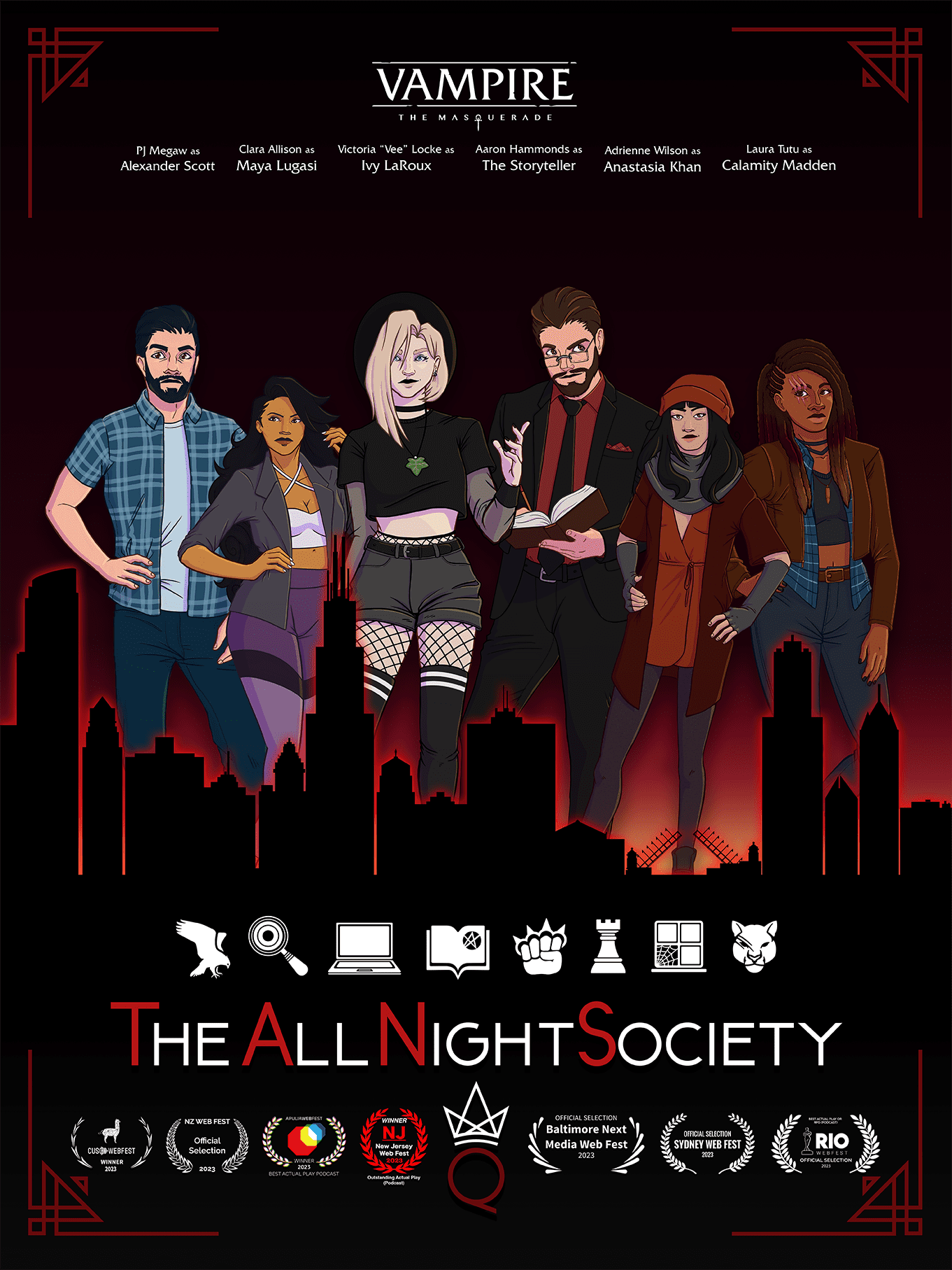
The All Night Society follows a eclectic coterie of vampires who expand past the traditional Eastern European archetype, directed by an omniscient (and opinionated) storyteller, played by Aaron Hammonds. Narrated more in the style of a novel, the storyteller engages directly with the internal monologue of each player character. Each player (Vee Locke, Laura Tutu, PJ McGaw, and Clara Allison) brings their own cultural context into the mythos of The All Night Society to navigate the intersections of traditional vampirism with the experiences of Blackness, Judaism, and gender.
However, it’s not only the story that makes Queens Court Games unique. Both in front of and behind the mic, the team at Queens Court Games highlights some of the best actual play has to offer. Their community-focused production style is constructed on a foundation meant to uplift the people on their show, and the actual play community as a whole. This isn’t even to mention the seamless sound design by producer Aubrey Vakarian.
The Fandomentals had the opportunity to sit down with the QCG team about The All Night Society, their visions for the future of the medium, and what success looks like in the developing world of Actual Play.
The following interview has been edited for clarity and length.
Could you guys give a little bit of a rundown of what Queen’s Court Games is, what you guys stand for, what you’re trying to do in both the TTRPG space at large and with actual play specifically as a medium?
Aaron: Well, we started out like everyone does, playing just a home game. Vee and I were playing Vampire the Masquerade, and we had this really good scene, which led us to the critical mass of ego required to start a podcast.
I think the difference between like the kind of way we got an actual play and a lot of others is we said, “Let’s check out the environment, see what’s out there.” [We were] thinking about what niche can we fill? How can we distinguish ourselves in what’s a super, super crowded market? And we arrived at, I think, three places that really help us be who we are.
One is character focused stories. No matter what genre we’re playing in, no matter what system, I care a lot less about what it looks like when someone is fighting a dragon and a lot more about how did you get to the point where you fight dragons for a living? Like, where did your life go wrong that you’re not a blacksmith somewhere living a cool, easy life? Or like, why are you trying to find Cthulhu? How did you end up with the attention of the demiurge and cult? And these are all really interesting questions that I don’t think actual play touches on.
The second part I ascribe to a narrative philosophy that you can only really tell stories that are at least adjacent to your life experience. Actual play is already quite full of the stories of five cis-het white men from Wisconsin.
The last part is, as best as we are possible, we wanna pay people for that work. Certainly not what they’re worth, because we’re an actual play company. We make a point to make sure that whatever we make, we share equitably and that we can kind of bring everyone up together.

Laura Tutu: I’m here because as many people did, the panorama happened. We were all locked in our houses. We discovered this little thing called TikTok. And it’s like, I’m a theater kid. I need at least some level of entertainment or validation, or I will die like Tinkerbell.
So I was making my little TikToks and doing my little dancey dances and making all these goofy little characters. And apparently V saw me at one point and said, “‘Aaron, if you don’t bring her in for The All Night Society, I’m gonna quit.'” So that’s when I got the message from Aaron. And being a black femme on the internet, you get a lot of messages from a lot of white folks who want you to come in and do a diversity for them.
So I’m gonna be perfectly honest, I was super hesitant at first. Super hesitant because you gotta be real goddamn careful out there.
But after sitting down and having the conversation with Aaron and me, it was very much obvious that they were walking the walk and talking the talk. I don’t think I’ve ever worked with folks who are so intent on taking things, we say this a lot, taking things professionally, but not seriously.
Could you explain what you mean? I think it’s pretty self-evident, but what does professionally, but not seriously, mean?
Clara: It’s one of those things where like, we all came at this, a lot of, uh, podcasts and actual plays come to the table being like, we’re just friends at the table, we’re doing the thing.
One of the things I always valued about QCG [is that] at the end of the day, we are telling a story for entertainment purposes. We do the work beforehand to kind of shape our characters and talk about the stories we want to tell. At the end of the day, yeah, we are, we are still friends, we are still playing a game. We are still making something for other people though. And I think that’s what that means when we say professionally, but not seriously.

Aaron: Occasionally the morally correct thing and the capitalist correct thing line up. When that happens you kind of want to seize on it, because that doesn’t happen very often.
When we approach our scheduling, the way we handle pitches, the way we divide labor amongst one another, that kind of stuff helps us be thematically consistent in our releases. You can kind of tell what a QCG thing looks like. People can see that visual language or understand the story language. They know what they’re getting when they come here. And that comes from the organizational take ourselves professionally set. At the same time, like we’re not doing Kubrick stuff. No one’s getting screamed at.
There’s none of that like, pretension that comes from being like, big fish, small pond. We are very chill with one another. I don’t send out corporate emails. That’s the “not seriously.”
We had a casting call quite recently, actually. I don’t want to say the person’s name, but we asked our first set of questions. Like, ”Hey, what are some things that you think really make you stand that as a performer? Are there things that we’ve put out as a network that you would really want to be a part of?”
And they saw that list and they said “The level at which you’re operating, I don’t think is really for me. That’s higher than I want to aspire to.” And we said absolutely not. We’ll take any meeting, because everyone who is where they are now, was somewhere else in the beginning.
I think that’s something really interesting as well, operating outside of the traditional hierarchy that comes with working in entertainment, working in the actual play space and really trying to be a collaborative community effort. Making people not self-reject is a really important part of bringing people onto the team. Laura, I see you aggressively nodding. Do you have thoughts?
Laura Tutu: I would like to point you towards a little project called Harlem Unbound.
I was only going to do social media and The All Night Society. I was handed the PDF for Harlan Bound by Chris Spivey, which is a wonderful supplement for Call of Cthulhu Seventh Edition out of the Harlem Renaissance. Black folks taking the stories of H.P. Lovecraft, the notorious racist, and getting our hands all over them and hopefully making him turn over in his grave. It was pitched that I would produce. I initially said, “Are you fucking crazy?”
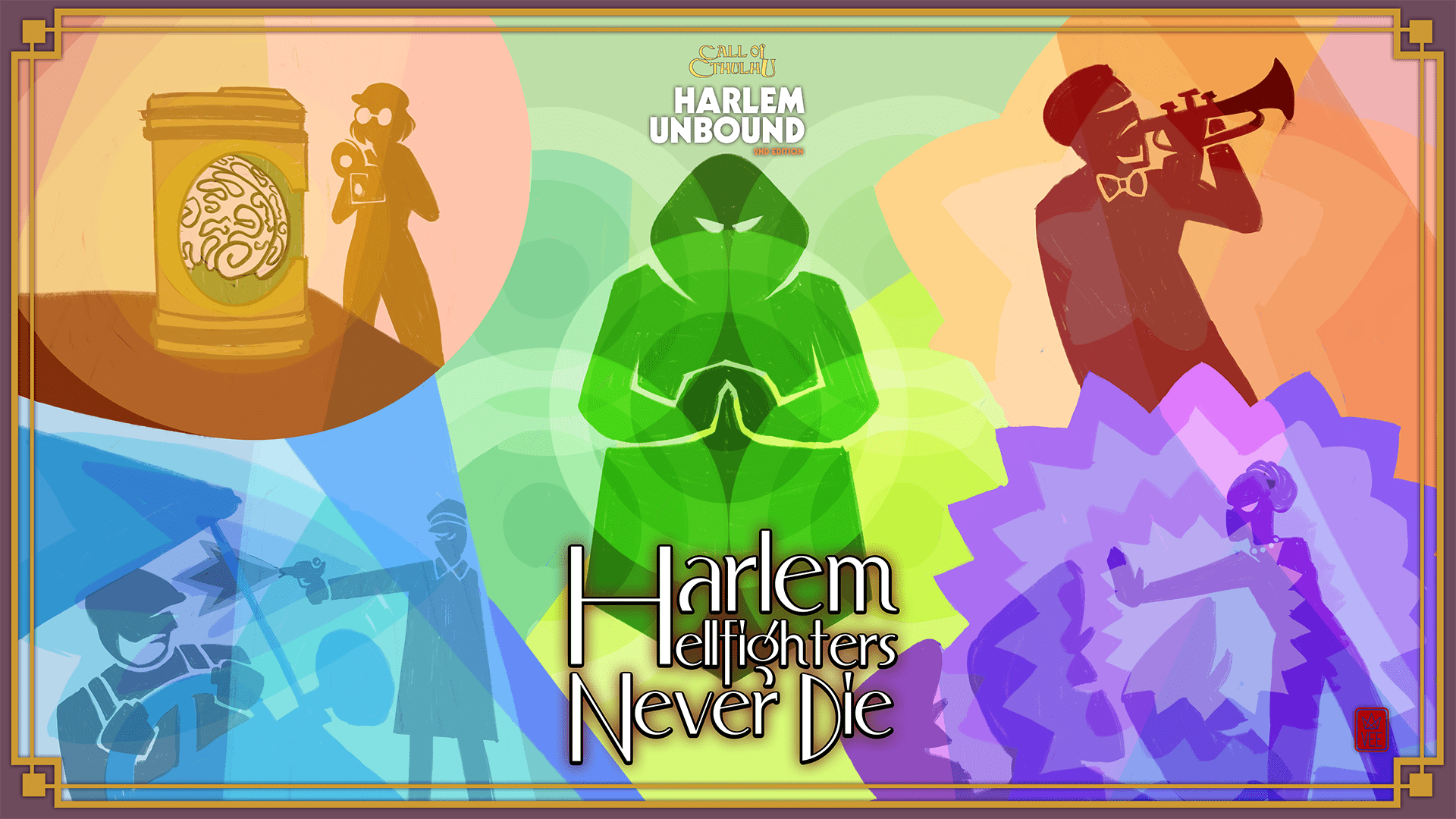
Then the next thing I know, I’m sending out emails to casting and finding the GM and then Vee’s teaching me how to run Premiere Pro and the series finished two weeks ago.
I don’t know what happened. But all that to say, it would not have happened if I had not been supported, if Aaron and Vee and the rest of the team had not looked at me and said, “Don’t cut yourself out of this, you are more prepared than you think you are.”
Aaron: You run into this Venn diagram in all art. On one hand you have crippling self-doubt, but also incredible ego. Wherever that overlap is where the art is. So taking yourself professionally is how we can get over that crippling self doubt, right? I know you have these skills and I can demonstrate it to you like in spreadsheet form. Then we kind of keep the ego in check part by just like, it’s not that serious, right? Like we can make mistakes. No one gets screamed at if an episode goes out 15 minutes late. We’ll do it and we’ll support one another. We’ll enable one another.
Aubrey: QCG has let me do some really good stuff because when a certain video game came out earlier this year that was causing a lot of problems online. On Twitter, I was like, “What if I ran Kids on Brooms with an all trans cast?” And then it was suddenly I woke up the next day and I had a hundred notes on the thing. I went to Aaron and I went, “I want to run this and I want to make sure people get paid for it, and we created Mysteries of Ravenswood.”
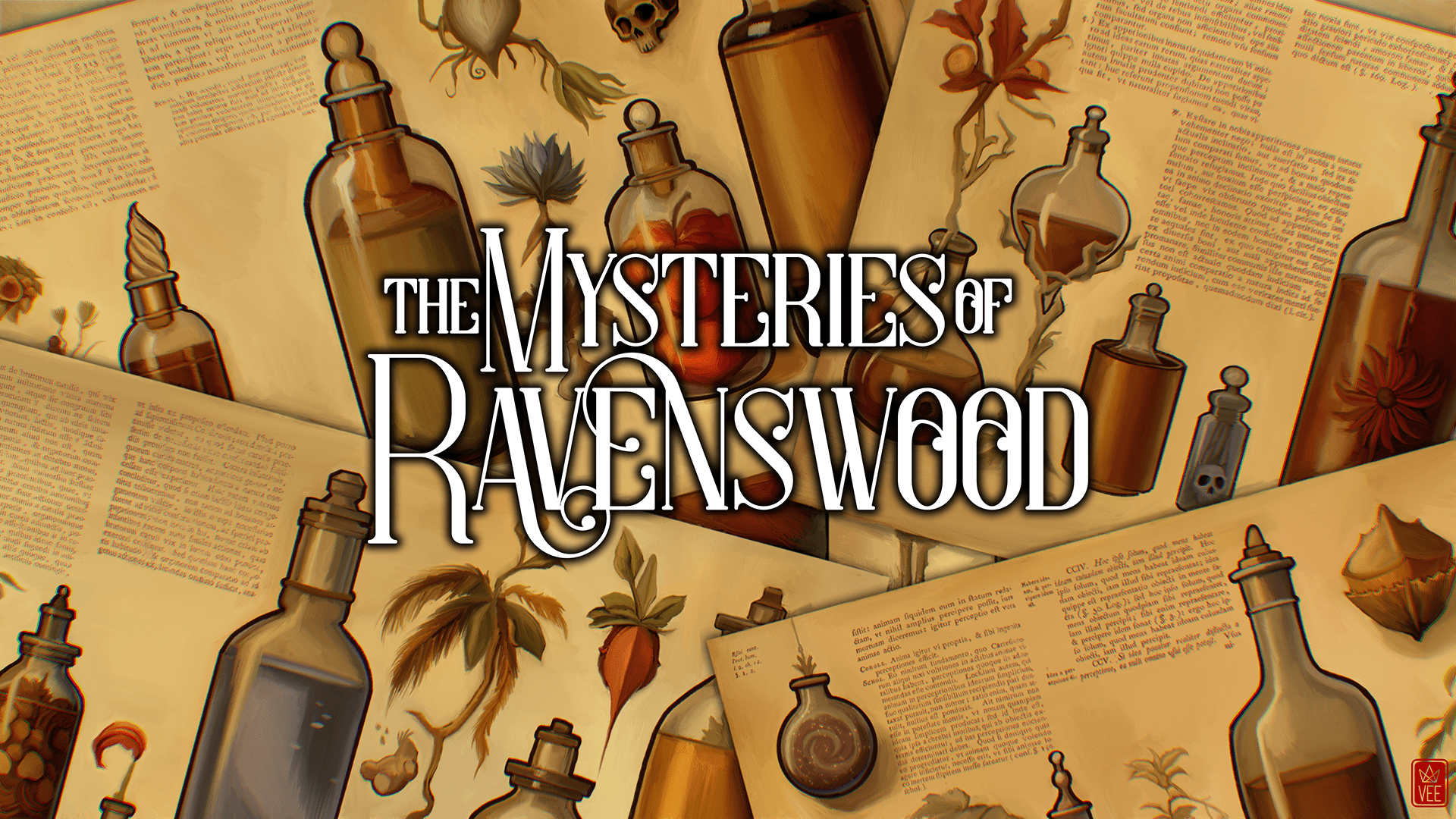
Clara: I’ve been in the actual play space for a while. I’m a nasty little art gremlin so I like being able to take the medium that we’re using and push it and do something with it. And QCG’s enabled me to do that.
I can go to Vee and Aaron and be like, “Hey, you know how us in these little boxes on a webcam look kind of like we’re in a mech, like in Power Rangers? Can I do a whole thing that riffs on that?” Vee has been so helpful with, pushing the visual aspect of actual play that we’re all familiar with.
Now shifting into the project that you won the award for, The All Night Society. You’re fighting in such a saturated ecosystem to get any attention on an actual play. You guys stand out in a very unique way, not just by the ethos that you have, but also the narrative style of your show and the choice to do Vampire the Masquerade over D&D.
Aaron: The All Night Society is Vampire 100%. I am such a big fan of that personal horror storytelling element. It is a game built to focus on characters. D&D is this empowerment about big, big worlds. We want to make a disempowerment about very, very small things. So that frame allows like what I think is my strongest part of storytelling to come forward
The way you relate to narration and character agency in The All Night Society, I think are nuanced and new to actual play. The way the show is performed sounds a bit more like a novel with an interactive omniscient narrator. What is that experience is like, both Aaron from the storyteller side, but also from the player side.
Vee: I don’t know when it happened exactly. It wasn’t something that we talked about. It just kinda started happening. As the series progresses, you get a little bit more of it as people start to understand exactly what role the storyteller takes.
A lot of times people treat the storyteller or the GM as just that is their role. They are here to facilitate things happening. But for The All Night Society, the storyteller is really there to kind of give you those insights into the player characters. So we just started treating the storyteller as another coterie member and interacting with him internally. We didn’t ever want to interact with other characters in that way because it reveals too much about ourselves, but we want, the people listening to be able to relate to us..
Aaron: Yeah, you use the word narration. That’s important to me, because if you’re reading a novel and the noir detective walks into the room, he’s telling you exactly what he feels like. If you’re reading the YA novel, you can see the suspicion inside that character’s mind. And in actual play, I mean just basic tabletop play, the only mechanism you really have to do that is through meta-narrative, where you can say, I’m doing such and such, oh, well, can I roll an insight check on that?
We very consciously think about the audience when making the show. If Ivy and Maya are squaring off on an idea, they both might be really not confident in that, but they are standing up because they’re double bluffing. That’s never going to come out in roleplay.
It does two things. One, it lets the audience see inside the characters in a way they also wouldn’t. And then two, Vee used the word facilitate. I often put the word instigate. because sometimes it’s just thoughts that haven’t occurred to that person yet. They have a belief, but you don’t know where the roots are until it’s challenged. And that brings out something about the character.
From the player perspective, how does that feel, as opposed to being at a normal table where you’re making all of these machinations internally?
PJ: My background is in a lot of theater and film and television acting. That demands a lot of trained vulnerability. A lot of “let the water rush off your back.” Feel the water, describe the water, and then forget the water was ever there.
I recommend this for a lot of people in this medium to do this too as actors, especially when you have ready yourself to deal with heavy themes and deeply personal stories. A lot of times I’ve just been trying to accept the dark and miserable question, give an honest answer, and then not care what you think about it, but hope you like it, kind of balance. And I think that’s something that we all are Responsible with as well.
If we can’t let it wash off our back, I’ve definitely been there when we’ve had to take a 15 minute break, do a check-in. “How’d that question make you feel? What do you need to kind of move past it?”
Clara: I have a different lens on it a little bit because when I joined the game in season one, I wasn’t supposed to stick around, which meant I could drive Maya like I stole her. I’ve joked that I’ve had to retrofit Pathos into this character.
So my experience with Aaron as a storyteller and The All Night Society tells stories, has been a little bit more coming in with a kind of antagonistic angle. It gives me an opportunity as an antagonistic character to give this character a lot more. I desperately need it so that Maya doesn’t remain just kind of a dick.
Aaron: I think the ones that come to me would be in Alex’s embrace [of his new vampirism] scene. There’s a version of that where you stick to the visual flair. But if you’ve listened to it, a lot of it’s just me really needling PJ about being a monster. Not letting PJ as an actor escape that feeling and then just hammering down on it to get PJ to like really just, there was a moment I was actually kind of worried because he got a little sniffy and I’m like, oh shit, did I break PJ for real? And like that’s kind of made a check in on.
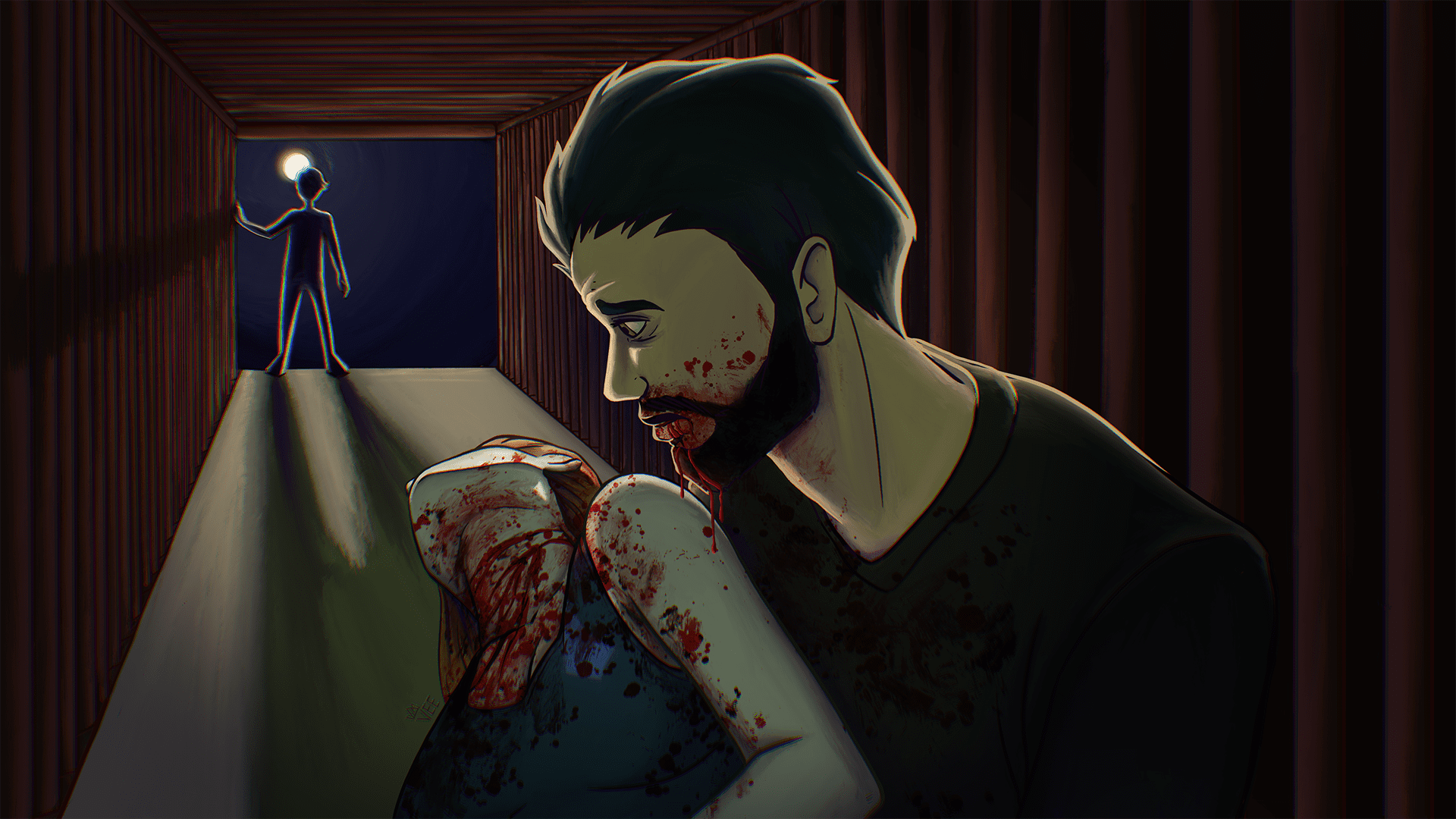
You get to see Calamity trapped between two worlds every time we have a small sidebar about being an other, whether that is outside of the Camarillo or as a Black woman vampire. Those things don’t come out naturally in conversation. We can do that through those conversations.
PJ: You’re saying something that’s very important right now, specifically in the actual play scene and the TTRPG industry as a whole, and that’s having the grace to sit in uncomfort.
We have kind of strayed away from the idea of “these are important conversations.” These aren’t going to feel good, and we need to sit in something that doesn’t feel good, especially when it challenges us, enriches us, enlightens us in some capacity. We have to be willing to open up a conversation piece across the board, success or failure.
Especially in the festival cut that you gave me, each of the scenes highlights using these games and using the story to sit within these larger moments of cultural criticism through the narrative. You maintain the immersion of the acting and the performance, but also it’s very clear that that’s a safe container for the performers to have this. How do you guys utilize safety tools within the context of the system, especially when you are tackling themes as heavy as the ones you tackle in this show?
Vee: Oh boy. We use all sorts of safety tools. We actually have all the safety tools that we use available on our website. It’s a front-facing page on our website because we do take them very, very seriously. Aaron doesn’t know whether he coined the phrase or not, but he likes to talk about getting us to a place where we are comfortably uncomfortable. You get to explore some really wonderfully heavy things when you allow yourself to. But knowing that everybody’s gonna do it really safely.
We use two different sets. We use a modified version of a Monte Cook form that we created for our own purposes. It lets you get really, really granular with all number of things. And then we also use a scene remote or scene change tools. It’s essentially like the buttons on your remote control. You’ve got play, pause, rewind, fast forward, and then stop, which is essentially your X card. If something happens, and if somebody says something that doesn’t sit right or you know, like if Aaron’s getting a little too granular with like the detail on a thing, you know, we could say, hey, okay, cool, we get it, move forward. Or like, no, I don’t like how this thing happened. Let’s rewind it. Let’s try it again. The control is always in the performer’s hands, always.
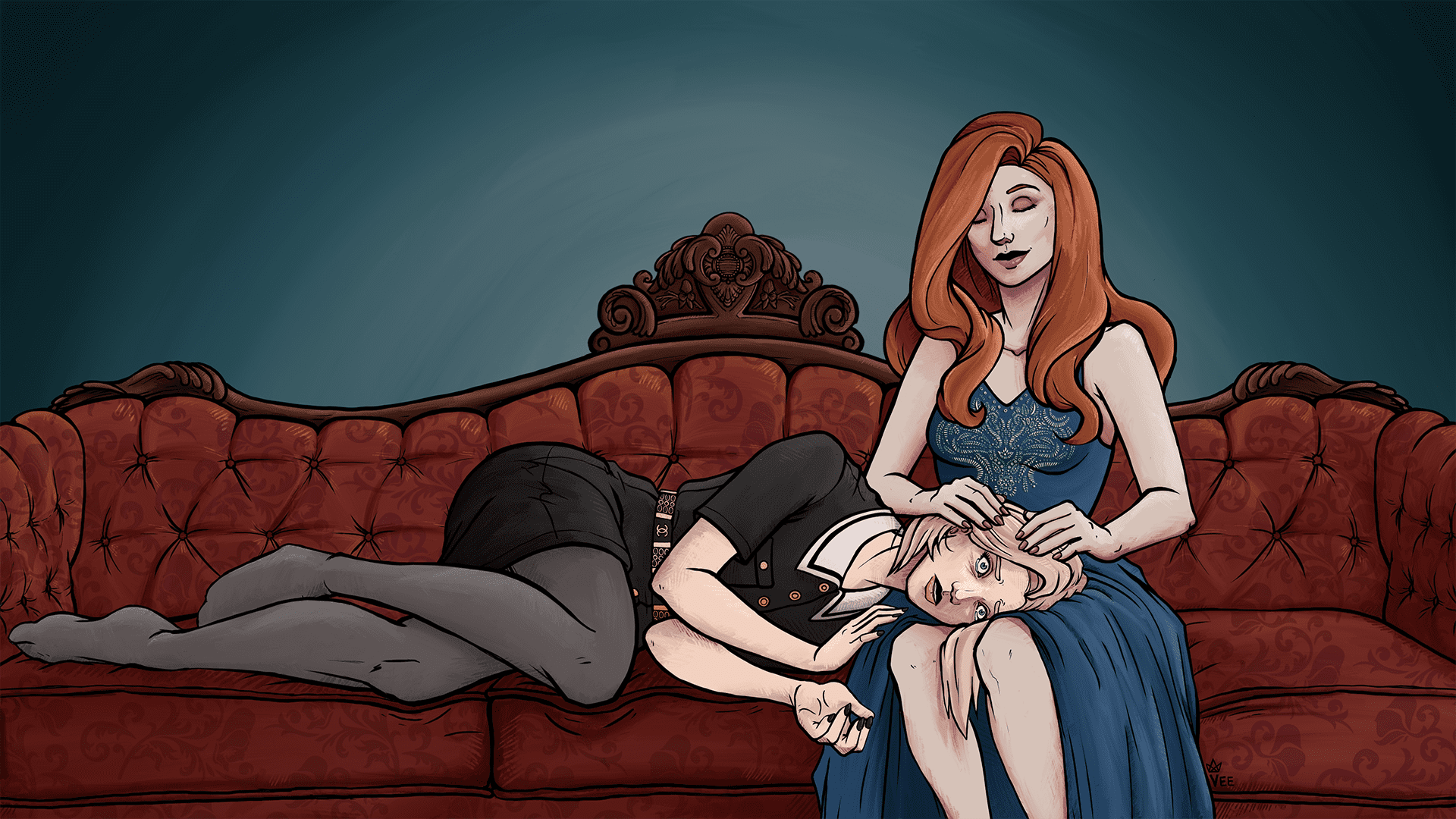
Aaron: We worked really hard on creating an environment of mutual respect to start with. That makes those openings possible. There’s a broader conversation about representation in media, which is definitely important. I’m a straight white man, so my perspective is a little skewed. Absolutely want more people of color in media, but if I introduce a character and their only defining features are that they are Black and a vampire, that’s a failure on my part. Is it better than nothing? Yeah, but is that enough? No.
But to ask Laura to share that part of themselves requires me to do the work first. That takes the form of the relationship we have, but also knowing that Laura has tools available. If there are conversations we want to have, but I’m not the right way to do it, then we find a way to make that happen. The Prince of Chicago is also a Black vampire and the way he was written in the V20 version is pretty messy.
Laura Tutu: It’s racist as shit. I mean, we all know what vampires are quote unquote supposed to look like. It’s people who look like Brad Pitt and Tom Cruise, who are lily white and blonde in varying degrees. The only black vampire that I remember seeing growing up was Blade. That was it, that’s all I had. And don’t get me wrong, I fucking love Blade. Homie is my hero. Wesley Snipes, I’m gonna fight you though.
For me, it is as simple as putting that representation in. I know how easy it is to become tokenized and to have people, call you up and be like, “Hey, we need a diversity. Can you come make us look good for the internet?” That has never been the case here. The case here has been, Aaron and Vee have both said, we can’t tell these stories. These stories are important. Will you help us tell them? Because we are not going to do it for you because we cannot and we will not.
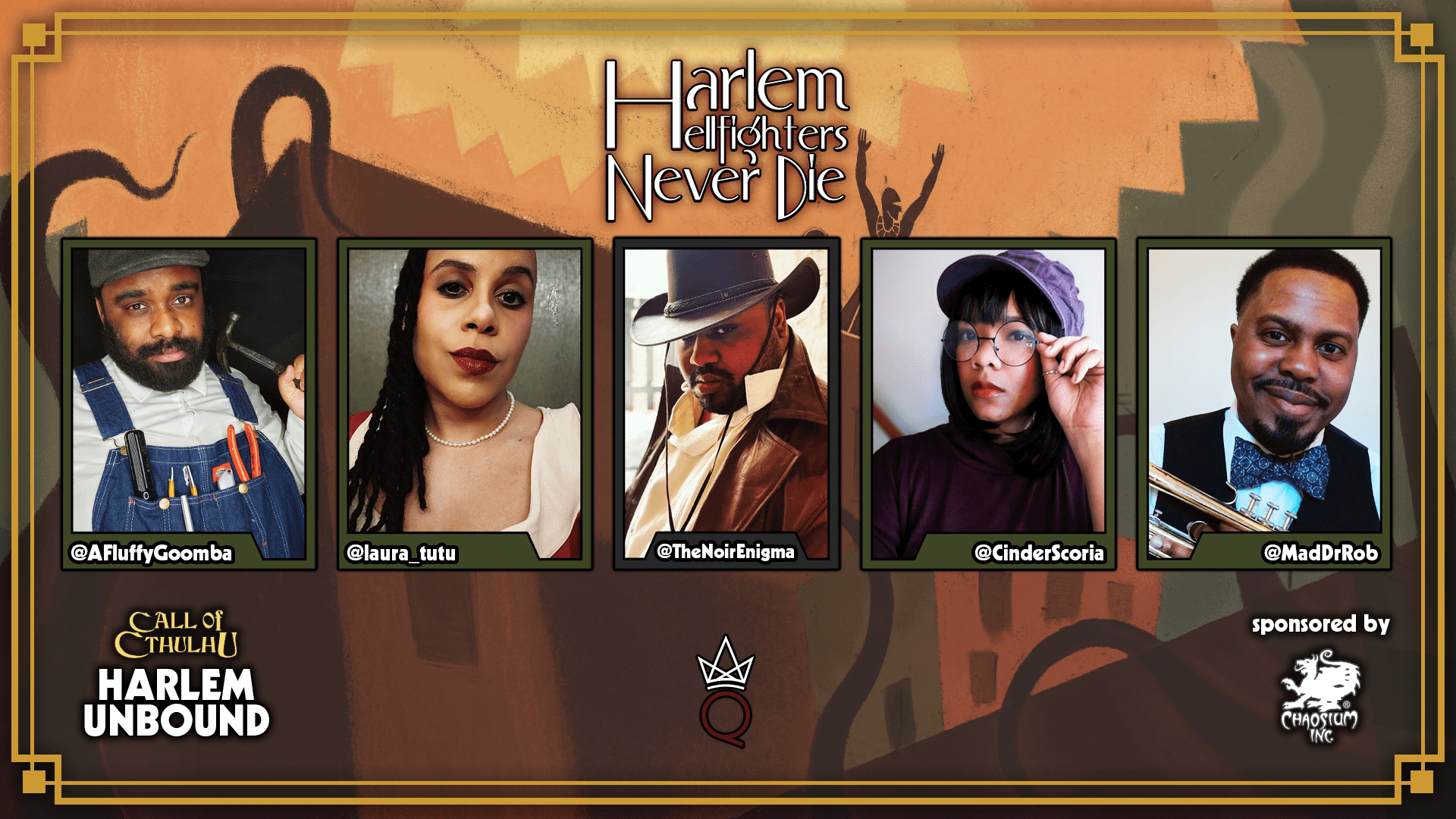
For me, Calamity is just taking everything that I love about vampire lore and from Vampire the Masquerade and putting it through the lens of the Black experience. Putting it through the lens of growing up dirt poor and Black in some of the most racist parts of this country.
Yeah, and that really comes across. The Prelude episode for Calamity is gorgeously heartbreaking, and truly the award you won for it was well deserved.
Aaron: Maya is also a canonically Jewish vampire, and we play around with those kind of tropes. But that requires Clara to know that I’m going to handle it correctly and defer to their judgment, because you start talking about like cabal of people who drink blood and control the world, oh no. So we wanna unpack that, but let’s do it in a way that everyone feels comfortable and everyone feels safe.
Clara: I was a creepy little kid, so the intersection between Judaism and vampire lore, but also just folklore in general has always been a big hyperfixation for me. For those who don’t know, Lasombra have been written to have been hidden within the Catholic church. So when I approached Aaron with this Lasombra characters, like my I’ll walk otherwise is that I get to make this character canonically Jewish. There’s so much within the baked in lore of vampire, the masquerade that is very Christocentric. It’s come up a couple of times where other games that we’ve looked at running have accidentally walked into a lot of anti-Semitic stereotypes.
And I’ve been very comfortable and empowered within the QCG like family to be able to be like, “Hey, I don’t know if I’m being overly sensitive, but I want to have another look at this to maybe remove some of these things that are unconsciously recreating. these antisemitic tropes.” I’m very excited that I get to do all of that and bring something that’s a huge part of my identity into the space.
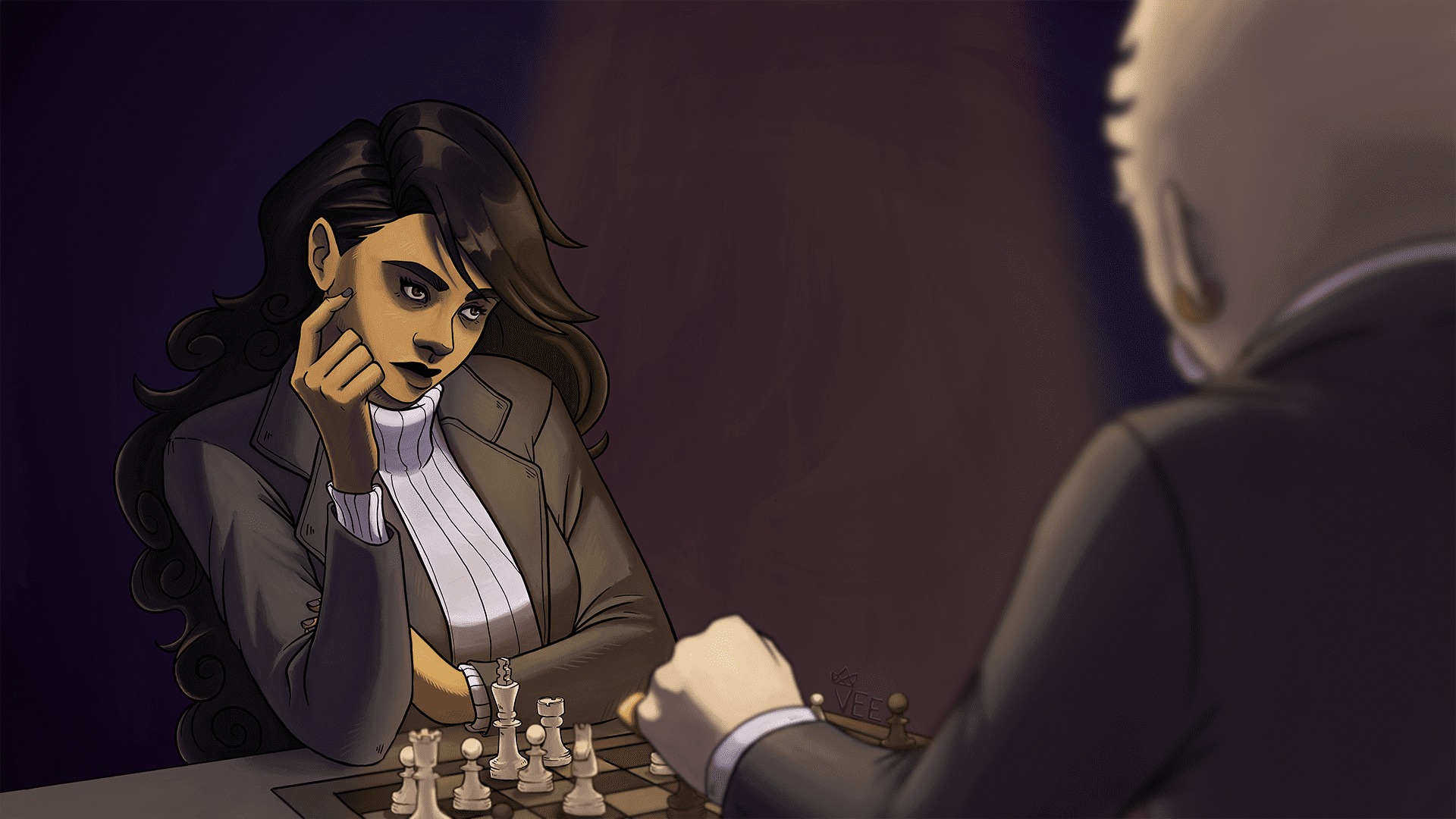
Aubrey, you have been so wonderfully patient as we kind of have going through all of these questions. About the sound design for this show and the way that you bring all of these stories to life, what does that look like on your end as someone who also engages in the medium of actual play? What are you trying to do with your editing that is specific to this story?
Aubrey: Music is one of those things that I feel like I’ve stumbled into. I have a slight musical background, but I also have a big musical theater background. When I approach music I assign the music to characters and moments.
When I was brought in to do all of this, I sat down with Aaron and Vee, and we made a massive playlist. The first two episodes is very much me kind of experimenting and getting the feeling for these characters and their themes. Everyone has not necessarily a song, but a musical vibe.
You don’t want it ever to overtake what is going on. It’s a thing you notice, and maybe it’s a thing you tune out and you don’t always notice in the background.
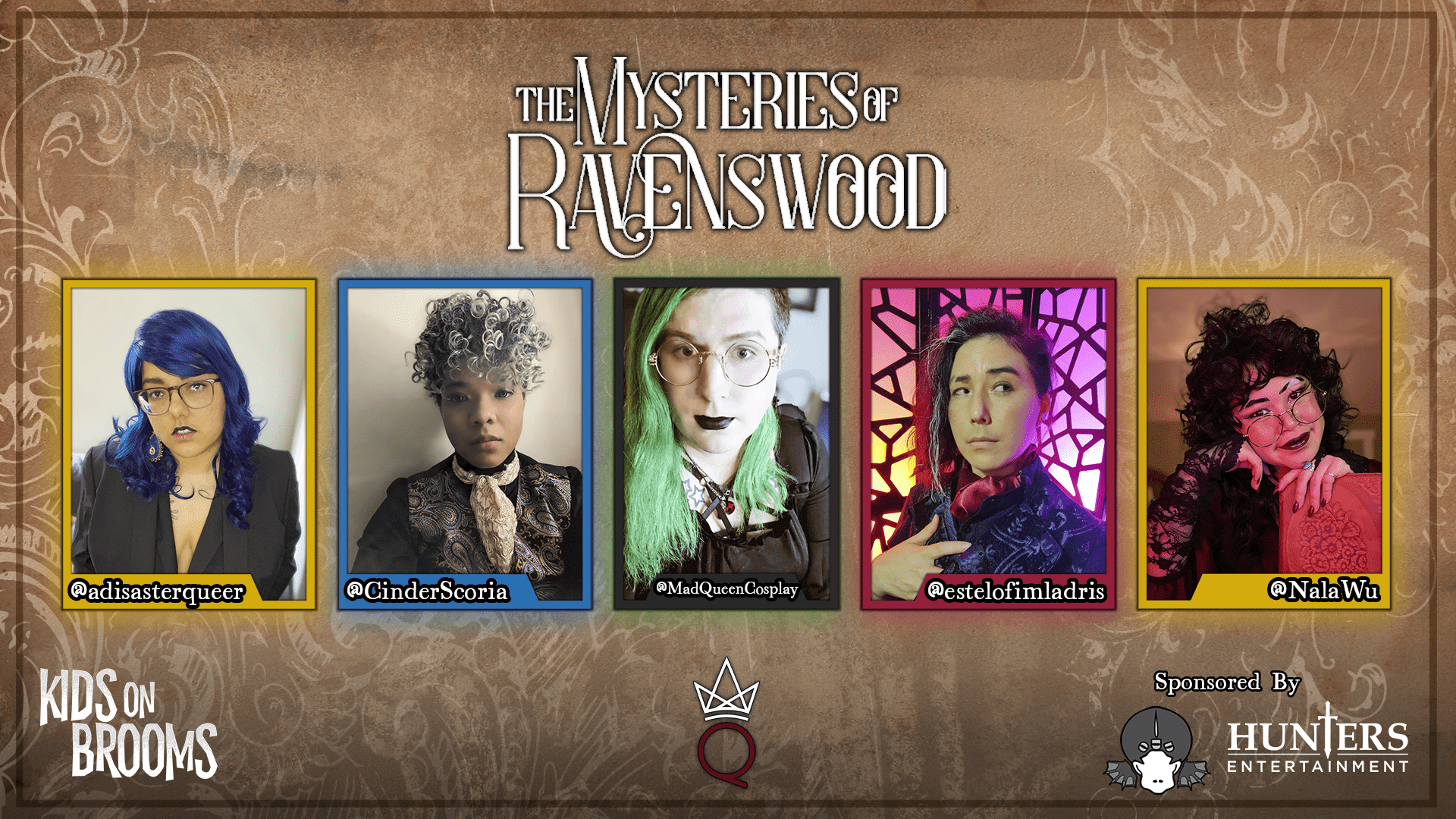
Aaron: Important to note that we’d submitted The All Night Society to Festivals before this year. Pre-Aubrey, we were accepted to zero of many festivals. Post-Aubrey, we have won every festival we’ve submitted to, with the exception of one.
Earlier in the interview, Aaron mentioned this idea of, “What is success?” I want to ask what success looks like for you as a person within the actual play space and what you think success looks like for QCG games.
Aaron: Oh god. So those two things for me are actually overlapped. Like, I think we’ve communicated, we’re all in this boat and wherever it’s going we’re going together. I will not be happy as a creator if everyone in this room, yourself included in different capacity, are riding this wave with us.
I want QCG to have a reputation for really great quality narrative games to be able to tell stories that Speak to people as individuals and make brands feel seen like these people get what we were trying to do
Vee: I’ve already achieved success in the actual play space. I recently had somebody say, Vee, you play Ivy so well, it makes me want to fix her. And that to me is, honest to God, the biggest compliment that I could have gotten. I have done my job as a performer.
For QCG, it’s always been a place for us to get to tell the stories we’ve never been able to tell or that we can’t really tell anywhere else. Whether that’s a story that, like, I personally get to tell, or whether it’s watching Harlem Unbound happen and just being able to cheer it on from the sidelines, or watching Mysteries of Ravenswood, or watching Mekong.
Laura Tutu: I started doing APs, again, as many people did, in the midst of the pandemic, because I was a theater kid and suddenly couldn’t do theater anymore and needed something to do or I was going to lose my mind.
I also have like a full-time job.
So like, my goals in the AP space are slightly different from those who have decided to make this their career. I use my nine to five to fund what I do here to feed my soul.
But I would like for that to continue. I would like to be able to tell these rich narrative stories with this lovely group of people that I have found. I would like to use our platform and put that ladder down and pull more people up with us as we go. I think that’s one of the most important things, especially in this industry. I know it’s super saturated and I know that it’s really hard to like get that time in the spotlight, but like you don’t gotta elbow the person in the face next to you to get there, my guy.
That’s been one of my big things coming into this space. I want to lead and move forward with, like you said, with intentionality, but also with deliberate kindness. That is super important to me in this space. And that is what I would like to continue to bring personally and help QCG maintain.
PJ Megaw: Everything about the AP world comes down to the big three things for me: safety, stability, and growth. We all want to have this metric where we’re like living in castles but the reality of that is statistically not really that high. But there is something we can take from this that will fulfill us as people.
I want to know that my voice belongs here, that I’m not just being tolerated, I’m being accepted. This is actually a place where I belong. I can do this in a way that I don’t have to worry where my next meal is coming from. That there’s a joy to this and doing this will support me in return.
And of course, growth. I want to have the freedom and ability to stretch and see where I can go. And I think once we all have to achieve that kind of landscape, then we’ll know that no matter what capacity we’re functioning in, we’re, we’re doing so successfully.
You can find new episodes of The All Night Society every two weeks on Queen’s Court Games or wherever you find podcasts.
Images via Queen’s Court Games
Have strong thoughts about this piece you need to share? Or maybe there’s something else on your mind you’re wanting to talk about with fellow Fandomentals? Head on over to our Community server to join in the conversation!

